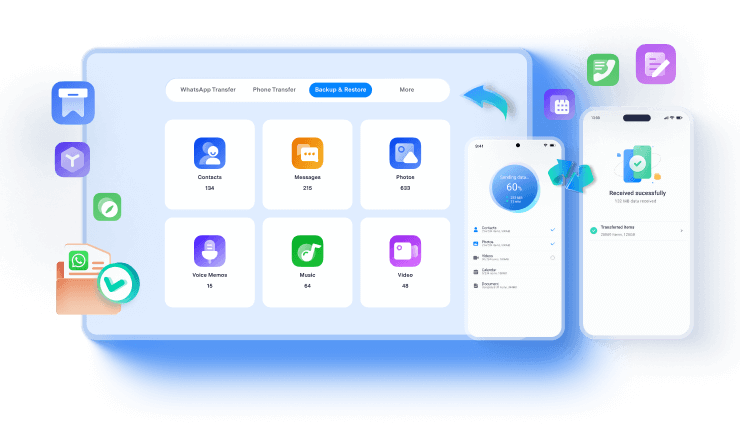While iTunes may be one of the best ways to backup and restore your iPhone, iPad or iPod Touch, the whole process is not without its problems. Online tech-related forums including Apple Communities are laden with users describing many different problems they’ve encountered with iTunes. So, if you are encountering a problem restoring your device in iTunes, read on. We have outlined some of the most common iTunes problems and their solutions.
Part 1. Top 10 Tunes Backup & Restore Problems and Solutions
The following are some of the most common iTunes backup and restore problems as well as some of the most effective solutions.
1. Backup Could not be Saved on the Computer
This problem will more often manifest with a set of error messages such as “iTunes could not backup iPhone because not enough free space available on computer” or “iTunes could not backup iPhone because could not be saved on computer.”

The following are just some of things you can do to try and fix this problem.
Restart both your iOS device and your computer
Once you have restarted both devices, try to create the backup again.
Update iTunes
It is also likely that your iTunes may be outdated. You can update iTunes from within the program or better yet, uninstall iTunes and download the latest version from the Apple website.
Check your Security settings
The security software on your computer could be interfering with the backup process. Therefore, you may want to update any security software you are using or temporarily uninstall it before trying the backup again.
Rename the Backup File
Renaming the backup file to avoid any conflict is also something that might work. Here’s how to find the iTunes and iOS backup files for both Windows and Mac.:
- Mac OS X: ~LibraryApplicationSupportMobileSyncBackup
- Windows 8, 7, Vista: ~ UsersUSERNAMEAppDataRoamingApple ComputerMobileSyncBackup
2. No Enough Space Available on this Computer
Are you trying to back up your iOS device only to get an error message that says, “iTunes could not backup the iPhone because not enough free space is available on this computer” yet you know you have more than adequate space? Here are a few solutions you can try.

Restart both the device and the computer and then try to back up again.
Make sure that the connection between the computer and the device is correct. Check that the USB cables are working correctly. It may even be a good idea to change the cables you are using.
Delete Corrupt Backups
They could be keeping you from creating any new ones. To do this, go to iTunes > Preferences > Devices and select a backup file to delete.
Update iTunes
Also, check if you have the latest version of iTunes. If you don’t, update it.
3. iTunes could Not Recognize your Device
If you connect your device to your computer and iTunes fails to recognize the device (you don’t see the iPhone icon), the following are just some of the things you can try to do.
Restart the device and your computer.
Check that you have the latest version of iTunes. If not, update iTunes before trying again.
Make sure that the iOS device trusts your computer. When prompted, unlock the device and then tap “Trust.”
Make sure Apple Mobile Device Driver is installed. This typically applies for Windows users. Follow these steps to ensure you have the necessary drivers.
Step 1. Connect the device to your computer and when iTunes opens, close it.
Step 2. Press “Windows Logo” and “R” key simultaneously to open “Device Manager.” In the window that appears type, “devmgmt.msc” and click “OK”

Step 3. Under “Universal Serial Bus controllers” you should see “Apple Mobile Device USB Driver”.

4. The Lockdown Folder is Corrupt
It is quite possible that you are experiencing problems with your iTunes backup because the lockdown folder which is a protected folder on your computer containing temp data (your syncing data) is corrupt. It therefore becomes necessary to delete the Lockdown folder. Here’s how to do it for both Windows and Mac.
Windows Users
For Windows, you can simply delete the folder since iTunes will recreate it. Follow these simple steps to do it.
Step 1. Click on the search icon (magnifying glass icon) for Windows 8 or 10. Windows 7 users, click on start to find the search icon.
Step 2. Type in “Program Data” and then press enter
Step 3. Open the Apple folder and then delete the Lockdown folder. You may need to be signed in as the administrator to do it.

Mac Users
For Mac users, you will delete all the files in the lockdown folder but keep the folder intact.
Step 1. From the Finder, click “Go” and then “Go to Folder”.
Step 2. Type “/var/db/lockdown” and then return.
Step 3. Select all the files to delete them. Don’t delete the lockdown folder.

5. Security Software Conflicting with iTunes
If you are having problems creating a backup or if iTunes simply won’t recognize the device. It is likely that the security software on your computer could be preventing communication between your computer and Apple servers. The following are just some of things you can do.
- Update the security software you are using. If that doesn’t work, temporarily uninstall the program.
- Check for System updates for Windows or OS X
- Make sure that your date, time and time zone are correctly configured on the computer.
MobileTrans - Restore
Easy to Backup to PC and Best Way to Restore iTunes Backup in 1 Click!
- • Backup and restore data on your device to a computer with one click.
- • Easily restore photos, videos, calendar, contacts, messages and music from iTunes to iPhone/iPad.
- • Takes less than 10 minutes to finish.
- • Fully compatible with major providers like AT&T, Verizon, Sprint and T-Mobile.
- • Support the latest iOS and Android OS.

 4.5/5 Excellent
4.5/5 Excellent6. This Device is Not Compatible for Requested Build
This is a problem many users face when they try to restore the device in iTunes. You may get an error message that says, “The iPhone (device name) could not be updated. The device isn’t eligible for the requested build.” Here’s what you can do.
Start by updating iTunes. When you are certain iTunes is up to date, check the host files to ensure that your computer is in contact with Apple servers. Follow these simple steps to do that.
Step 1. Launch Finder > Click Applications > Double click on Utilities and then select “Terminal.app”.
Step 2. Enter the command: sudo nano/private/etc/hosts and then press the Return button. Enter your password when requested.

Step 3. Using he arrow keys, find “gs.apple.com” and then add the # symbol, a space and (“#) to the beginning of the “gs.apple.com” entry.
Step 4. press Control-O to save the file and press enter when prompted about the renaming of the file. Press Control-X to exit the editor and then restart the computer.
Try restoring the device again.
7. iTunes Backup was Corrupt or incompatible
This is another common iTunes problem. You ty to restore the device only to get an error message saying “iTunes could not restore iPhone because the backup was corrupt or not compatible with the iPhone that is being restored.”
To fix this problem, you will need to delete the corrupt backup files before creating a new backup in iTunes and restoring the device. To delete the corrupt backup files, follow these simple steps.
Step 1. Open iTunes and then click “iTunes” at the upper left corner. Click “edit” on the iTunes interface and then select “Preferences.”
Step 2. Find your device in the backup listings and select it to delete the old backups.

8. The Firmware File is Not Compatible
This problem can occur when you try to update and restore your device via iTunes. To fix the problem, try the following solutions.
- Restart both the device and your computer
- Disable the Antivirus software on your computer
- Update or re-install iTunes
If all of the above still don’t work, try downloading the right Firmware file for your device. The following steps will guide you.
Step 1. Visit the www.ipswdownloder.com and on the homepage, select the device you want to download for. You can select the right ipsw file according to the device model and version of iOS.

Step 2. Once you’ve downloaded the firmware file, connect the device to your computer and run iTunes. Click on the device’s icon in iTunes and then hold down Option key (Shift key for PC) and click “Update” or “Restore.”
Step 3. Select the ipsw file you downloaded and click “Choose” and allow the device to update normally.
9. Not Enough Space on the iPhone/iPad to Restore
If you try to restore the device but iTunes tells you there isn’t enough space in the device, yet you know there is, try the following solutions.
- Update iTunes
- Upgrade iOS to the latest version
- Restart your computer and the device
- Update or uninstall the security software on your computer
10. Failure to Communicate with Apple Servers
Sometimes when restoring or updating the device via iTunes, you may have an issue with downloading the new iOS firmware or getting a connection to verify the restore process. Check that your internet connection is working properly. Ensure that there are no issues with your router Sometimes the problem might not be your systems. Make sure that Apple servers are not down. Go to https://www.apple.com/support/systemstatus/ to check that everything is running OK.
Part 2. Useful Tips When using iTunes
The following general tips should come in handy when you’re using iTunes to backup and restore your device.
- As many of the solutions in part one have pointed out, the first thing you should do when using iTunes, is make sure you have the latest version. Many errors can be fixed by just updating iTunes.
- It is also a good idea to keep your device connected to the computer as during the backup or restore process. Premature disconnection can cause errors.
- Try rebooting both the computer and the device before undertaking any drastic measures.
- Finally, sometimes it may not be your system’s fault. Apple servers could be down causing the miscommunication between Apple and your computer. Try again a little later.
These are just some of the most common problems you may experience when using iTunes. We hope you find a solution that fixes your particular problem.
New Trendings
Top Stories
All Categories










Nicola Massimo
staff Editor